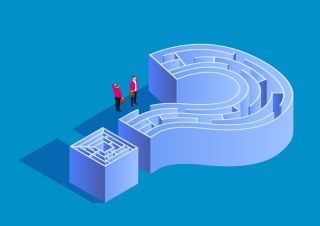Intuition
Embracing the Unknowable Can Illuminate Your Path Forward
The various ways in which we can interact with the unknowable.
Posted December 31, 2022 Reviewed by Vanessa Lancaster
Key points
- The unknowable, or the unprocessed external stimuli the brain holds on to, plays a key role in whether you reach your goals.
- Intuition, prayer, meditating, and listening to music can help you navigate the unknowable.
- The key is to pay attention to intuitions that honor your deepest needs and to test them.

Over the years, great thinkers have pointed to an unknowable aspect of life that profoundly affects whether we reach our goals. Carl Jung described the “psychoid” as an unknowable connection between the mind and body.1
Wilfred Bion described “beta elements” as unprocessed external stimuli that “hang around” in the mind/brain without being attached to a thinker.2
Various religions point to an unknowable God.3 Quantum physicists have pointed to unknowable factors that underlie how two objects can instantly affect each other’s behavior across vast distances.4 All these factors, though unknowable, can profoundly affect our minds, bodies, and lives. Therefore, it is worth considering the various ways in which we can interact with the unknowable. In this brief essay, I will provide a few frameworks for how you can escape the entrapment of a knowable life to potentially impact the progress you desire.
Intuition
Marcel Proust once said, “The real voyage of discovery consists not in seeing new landscapes, but in having new eyes.”5 In our day-to-day lives, we use our five senses to understand the world, yet intuition is a hunch that can guide us very well into the future. I see intuition as a temporary formulation of reality asking to be tested. As such, it comes from the assimilation of subtle information that the logical mind could not construct, yet it is often ignored.6
When something is unknowable, logic cannot help, but intuition is a potential source of the dots you need to join to make the unknowable manifest. The key is to pay attention to intuitions that honor your deepest needs and to test them to decide whether to document the dots as they emerge.
Prayer
Kierkegaard once said, “The function of prayer is not to influence God, but rather to change the nature of the one who prays.”7 People who practice devotional prayer report that it can help lower anxiety.8 It can help you surrender, opening your mind to new ideas outside of its habitual workings that define your life.9 When you pray, your mind conjures up images of the unknowable, and these images can also be explored to determine if they are worth documenting as dots that you will later join.
Music
Einstein once said about his theory of relativity, “It occurred to me by intuition, and music was the driving force behind that intuition. My discovery was the result of musical perception.”10 Music is a powerful force that can enhance your subjective experience of life, activating an essential component of your thinking.11 When you produce music, it represents a language of feeling, bringing form to the unknowable.
Qualia Navigation
Qualia are highly subjective experiences that an individual feels but cannot exactly communicate to anyone else. David Chalmers once said, “Sense data are much more controversial than qualia because they are associated with a controversial theory of perception–that one perceives the world by perceiving one's sense data, or something like that.”12
When you notice your qualia, you submit to the fact that subjective experiences cannot be exactly communicated, so when you pay attention to how you see red or taste umami, rather than generalizing this experience, you pay attention to the details of your experience, allowing the undefinable to exert power over your choices despite it being beyond your grasp.
Meditation
Arianna Huffington once said, “Meditation is not about stopping thoughts, but recognizing that we are more than our thoughts and our feelings.” 13 Meditation can enhance your consciousness experience14 to the extent that it can even protect your genes.15
The impact of meditation may not be immediate or overt, but over time, it introduces you to mental states that are beyond your usual waking consciousness or deep sleep. When you meditate, you encounter and interact with the unknowable in an unknowable way, and in so doing, you may enjoy the benefits of watching the unknowable manifest in your life.16 Think of it as inner space travel, where you discover aspects of yourself that only the silent mind can illuminate.
Virtual Reality (VR)
Brennan Spiegel once said, “Virtual reality is like dreaming with your eyes open.”17 One scientific review pointed out that VR can instigate non-ordinary consciousness, thereby promoting questions and interactions outside of the phenomenal world.18 In that sense, VR is very useful for understanding the unknowable more deeply.
To Get Started
Imagine a goal you don’t know how to reach each day of the week. Accept that your path to this goal is unknowable. Then, spend five to 10 minutes examining your intuition, praying, listening to music, registering your qualia, meditating, or experiencing a virtual reality experience. When you do, you will be able to understand how the unknowable can serve you more deeply.
References
(1) Addison, A. Jung’s Psychoid Concept and Bion’s Proto-Mental Concept: A Comparison. J Anal Psychol 2016, 61(5), 567–587. https://doi.org/10.1111/1468-5922.12259.
(2) Kohon, S. J. Making Contact with the Primitive Mind: The Contact-Barrier, Beta-Elements and the Drives. Int J Psychoanal 2014, 95 (2), 245–270. https://doi.org/10.1111/1745-8315.12140.
(3) Davoodi, T.; Lombrozo, T. Varieties of Ignorance: Mystery and the Unknown in Science and Religion. Cogn Sci2022, 46 (4), e13129. https://doi.org/10.1111/cogs.13129.
(4) Castelvecchi, D. How ‘Spooky’ Is Quantum Physics? The Answer Could Be Incalculable. Nature 2020, 577(7791), 461–462. https://doi.org/10.1038/d41586-020-00120-6.
(5) Adamis, T. “The Real Voyage of Discovery Consists Not in Seeking New Landscapes but in Having New Eyes.” Marcel Proust. Retina 2012, 32 Suppl 1, S10-11. https://doi.org/10.1097/IAE.0b013e31823da9d5.
(6) Vatansever, D.; Menon, D. K.; Stamatakis, E. A. Default Mode Contributions to Automated Information Processing. Proc Natl Acad Sci U S A 2017, 114 (48), 12821–12826. https://doi.org/10.1073/pnas.1710521114.
(7) Kierkegaard, D. Anthony Storm’s Commentary on - Upbuilding Discourses In Various Spirits. http://sorenkierkegaard.org/upbuilding-discourses-in-various-spirits.ht… (accessed 2022-12-31).
(8) Upenieks, L. Unpacking the Relationship Between Prayer and Anxiety: A Consideration of Prayer Types and Expectations in the United States. J Relig Health 2022, 1–22. https://doi.org/10.1007/s10943-022-01708-0.
(9) Hatala, L.; Hatala, A. Devastatingly Beautiful. CMAJ 2022, 194 (14), E529–E530. https://doi.org/10.1503/cmaj.211982.
(10) A quote by Albert Einstein. https://www.goodreads.com/quotes/181131-human-beings-vegetables-or-cosm… (accessed 2022-02-27).
(11) Trimble, M.; Hesdorffer, D. Music and the Brain: The Neuroscience of Music and Musical Appreciation. BJPsych Int 2017, 14 (2), 28–31.
(12) David Chalmers Quote: “Sense data are much more controversial than qualia, because they are associated with a controversial theory of perceptio...” https://quotefancy.com/quote/1128399/David-Chalmers-Sense-data-are-much… (accessed 2022-12-31).
(13) Arianna Huffington Quote: “Meditation is not about stopping thoughts, but recognizing that we are more than our thoughts and our feelings.” https://quotefancy.com/quote/1246146/Arianna-Huffington-Meditation-is-n… (accessed 2022-12-31).
(14) Dresp-Langley, B. Consciousness Beyond Neural Fields: Expanding the Possibilities of What Has Not Yet Happened. Front Psychol 2022, 12, 762349. https://doi.org/10.3389/fpsyg.2021.762349.
(15) Wenuganen, S.; Walton, K. G.; Katta, S.; Dalgard, C. L.; Sukumar, G.; Starr, J.; Travis, F. T.; Wallace, R. K.; Morehead, P.; Lonsdorf, N. K.; Srivastava, M.; Fagan, J. Transcriptomics of Long-Term Meditation Practice: Evidence for Prevention or Reversal of Stress Effects Harmful to Health. Medicina (Kaunas) 2021, 57 (3), 218. https://doi.org/10.3390/medicina57030218.
(16) King, M. B.; Koenig, H. G. Conceptualising Spirituality for Medical Research and Health Service Provision. BMC Health Serv Res 2009, 9, 116. https://doi.org/10.1186/1472-6963-9-116.
(17) Virtual Reality Quotes. http://www.notable-quotes.com/v/virtual_reality_quotes.html (accessed 2022-12-31).
(18) Montes, G. A. Virtual Reality for Non-Ordinary Consciousness. Front Robot AI 2018, 5, 7. https://doi.org/10.3389/frobt.2018.00007.




